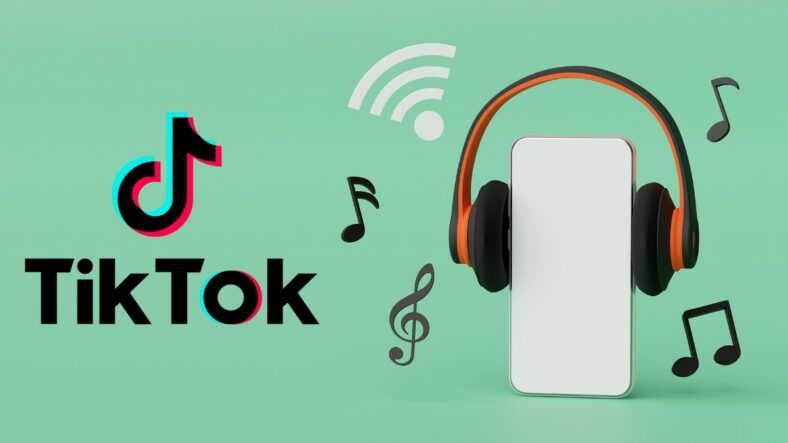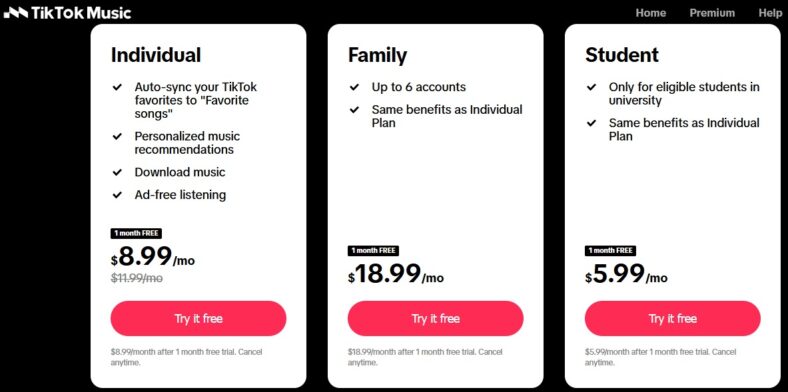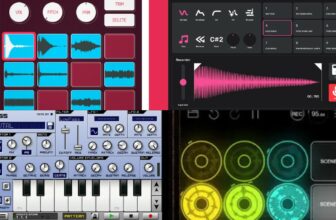TikTok Is Taking on Spotify and Apple Music With Its Own Music Streaming Service

TikTok users in Brazil, Indonesia, Australia, Mexico, and Singapore were the first to be given a chance to beta-test TikTok Music, the world’s newest streaming platform.
Music streaming has been around for a while now, with popular services such as Spotify reaching more than 220 million premium subscribers. In such a competitive industry, is there any room left for TikTok Music to thrive?
- TikTok Music focuses on in-app social features more than any other streaming service.
- TikTok Music’s initial prices seem to be similar to the prices of its main streaming competitors.
- TikTok Music allows users to comment on songs (and on comments made by other users).
- To get a TikTok Music subscription, you first need to create a TikTok account.
- TikTok Music has a good chance of competing with Spotify, in the same way TikTok competes with Facebook and Instagram.
- TikTok Music can make musicians a little bit richer and give way to empowering social music experiences, but it aggravates the main problems of the music-streaming age.
- TikTok Music will likely make arbitrary TikTok trends even more common and it’s designed to fit increasingly shorter attention spans.
It’s still too soon to measure the real success of TikTok Music, but there’s no question that the people who created TikTok know how to make an impact on the music industry. Did you know, for example, that TikTok users are 67% more likely to search for songs on streaming platforms after discovering them on TikTok?
In this article, I will review TikTok Music’s features, discuss whether or not it can replace the major players in the streaming world (such as Spotify), and assess some of its possible positive and negative effects on the music industry as a whole.
Contents
Is TikTok Music Any Good?
TikTok is the most addictive social media platform in the world—at least according to Gen Z users. For this reason, it is well-positioned to follow TikTok’s path: it was developed by the same people, it’s perfectly integrated with TikTok, and it has a similar user interface. But is it any good?
Even though TikTok Music is still a newcomer, it’s already fundamentally different from its main competitors in a myriad of ways. Most crucially, it has a strong focus on in-app social features, which makes it more community-based and share-centric than alternatives such as Spotify, Apple Music, and Tidal.
To evaluate whether TikTok Music is worth trying or not, let’s take a look at its distinctive features and limitations and see how its algorithm, catalog, and price compare to other streaming platforms.
Distinctive Features
These are TikTok Music’s most significant distinctive features:
- TikTok Music can be synced to any existing TikTok account.
- The platform revolves around a TikTok-style “For You” recommendation feed, which can be set either to “Fresh” (prioritizing new songs) or “Familiar” (prioritizing songs the user already knows).
- TikTok Music users can interact with each other by commenting on songs and replying to comments left by other users.
- Users can customize various styles before sharing songs with friends.
- TikTok Music features “Song Catch,” a song identifier app similar to Shazam.
- TikTok Music includes a “Party Mode.” In “Party Mode,” the volume of the songs can be turned higher than normal and your phone’s lantern becomes a strobe light.
In short, TikTok Music seems to distinguish itself from its main competitors by offering a more social music streaming experience, in which is easier to connect on- and offline (via “Party Mode,” for example) with other users.
Main Limitations
These are TikTok Music’s main limitations:
- TikTok Music users need to create a TikTok account to sign in to the platform.
- You need a third-party app (namely, TuneMyMusic) to import playlists from Spotify and other streaming platforms into TikTok Music. This service is free, but limited to a mere 500 songs; to import more songs, you need to pay.
In short, TikTok Music is limited because it requires its users to sign up for TikTok and isn’t as well integrated with competing platforms as it could be.
Algorithm
Algorithms are a fundamental part of what makes a streaming service successful, as they assist listeners in discovering new music or creating automatic playlists. It’s fair to say, for example, that if Spotify, Apple Music, or YouTube Music’s recommendations were meaningless, few people would rely on their services.
Right now, it’s still too soon to determine clearly whether TikTok Music’s algorithm is better than most. One thing seems to be clear, though: while TikTok Music’s algorithm seems to be great at stemming full playlists out of one single song, it’s not bias-free—especially if you’re into lesser-known genres of music.
In an article on TikTok Music, Business Insider journalists Kai Xiang Teo and Dan Whateley stated the following:
“We were genuinely impressed that TikTok Music’s similar mix of Illenium’s “With All My Heart” made a playlist of EDM-infused songs about life after or in love, which were so lyrically similar they might as well have all been written by Christina Perri.
Ditto for being able to create a playlist of extremely emo instrumental synth rock with a song from the progressive-rock group Archive.“
Different reviewers, however, have pointed out the fact that TikTok Music’s algorithm seems to prioritize artists from popular genres such as alternative- and hard-rock over classic hip-hop and jazz artists.
Catalog
According to the Australian website Pickr, “TikTok Music is relying on the same catalog both Spotify and YouTube Music use.” For now, there’s no reason to believe that TikTok Music’s catalog is in any way inferior to the catalogs of its main competitors.
Pricing

Music streaming subscription prices change all the time, but TikTok Music’s initial prices seem to be aligned with the prices of its main competitors. The student plan is just a little bit more expensive than Apple Music’s student plan; the family subscription is a bit more costly than Spotify’s, but slightly cheaper than Tidal’s. You can also try TikTok Music for free for one month and cancel anytime.
Will TikTok Music Replace Spotify?
Roughly one year before the release of TikTok Music, University of Colorado’s Ally Dever already considered TikTok to be the “go-to platform for discovering new music.” In fact, TikTok—the social media platform—has been changing the way the music industry works ever since it stepped into the scene.
TikTok single-handedly generated overnight successes, rehashed long-forgotten songs, inspired musicians to create shorter and shorter songs, and became the go-to music-discovery platform of a novelty-obsessed generation. TikTok Music will never replace Spotify because the two platforms will most likely continue to co-exist; but will it ever surpass it?
While it’s impossible to know the future, I believe TikTok Music has a great chance of becoming more popular than Spotify for the following reasons:
- Unlike Spotify, TikTok Music is all about social integration, which means it will be favored by listeners who enjoy sharing music with friends and family.
- TikTok Music is perfectly integrated with TikTok, so it will probably be the number-one music streaming choice of many of TikTok’s 1.1 billion users.
- TikTok is the preferred social media platform of younger generations, so TikTok Music will probably be more familiar to future music-subscription buyers than Spotify, Apple Music, or Tidal.
- ByteDance, the company behind TikTok, has a history of entering oversaturated digital markets (such as the social-media market) and giving a hard time to well-established competitors (such as Facebook and Instagram). It’s likely that TikTok Music will follow on TikTok’s path.
All things considered, there are many reasons to believe that, even if TikTok Music doesn’t replace Spotify, it will weaken its position as the world’s number-one streaming service.
Is TikTok Music Bad for the Music Industry?
There’s no doubt that TikTok changed the way the music industry works (the popularity of sped-up versions of songs is a good example), nor that it changed it in good and bad ways. But is TikTok Music going to have a similar effect? And how is it going to affect stakeholders ranging from ordinary music listeners to musicians and record labels?
While it’s too soon to determine whether TikTok Music is going to be good or bad for the music industry, I was able to list a few of its pros and cons:
Pro: TikTok Music will allow musicians and record labels to earn more money
The payment offered to artists by popular streaming services such as Spotify is far from fair. Nevertheless, any new streaming platform consists of a new opportunity for musicians and record labels to earn more money. If your EP is on 11 streaming platforms instead of 10, then you will have a better chance of making a buck.
Pro: TikTok Music can be an empowering social music experience
Unlike its main competitors, TikTok Music is based on the principle of music sharing, with users able to comment on songs and comments made on songs. This means that TikTok Music can be an empowering social music experience, giving way to active music discussions, non-algorithmic music recommendations, and in-depth descriptions of songs.
Con: TikTok Music will make arbitrary TikTok trends even more common
One of TikTok’s most annoying features is its uncanny ability to create arbitrary music trends. One minute you’re an unknown artist, and the next you’re blowing up everywhere because one of your beats was used in a viral TikTok challenge! This has helped a few artists go from zero to hero, but it hasn’t really benefited the music industry as a whole.
Arbitrary TikTok trends may be great for a lucky few, but they seem to arise from luck rather than merit. In other words, TikTok Music won’t do much good for an oversaturated industry where quality control is already desperately lacking. Glory goes for the lucky, not the talented or hardworking.
Con: TikTok Music is designed to fit increasingly shorter attention spans
Our attention spans are getting worryingly shorter and shorter, and social media platforms such as TikTok are the main cuplrits. Designed to be as addictive as a slot machine, TikTok is the main inspiration behind TikTok Music, and the newly-released streaming platform won’t do much to increase our already-debilitated attention spans.
This will negatively impact, among other things, the popularity of long-format music releases. Listeners have long shifted from albums to streaming, and the immersive experience of listening to a well-thought LP from start to finish will only become rarer and rarer with the advent of TikTok Music.
Verdict
Whether you like it or not, there will be no stop to the rise of TikTok Music. While the new platform will surely enable millions to discover new artists, it will also reinforce most bad habits that have characterized the music industry in the streaming age.
Will listeners continue to be numbed by computer algorithms and nonsense viral trends? Will musicians strive to make music that fits the needs of streaming platforms, curbing their creativity? Will streaming platforms insist on not paying authors fairly, leveraging their power over the entirety of the music industry? For now, only the future will tell.





